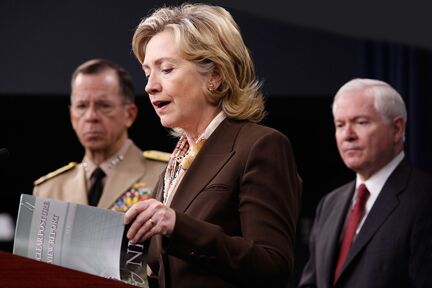
U.S. Announces New Nuclear Doctrine
On Tuesday, U.S. President Barack Obama announced a shift in America’s strategic policy with regard to nuclear weapons. This came ahead of a nuclear disarmament treaty due to be signed Thursday in Prague by Russian President Dmitry Medvedev and Obama, and also a nuclear safety summit next week that will be attended by more than 40 leaders, and a conference on the Nuclear Nonproliferation Treaty next month.
The Pentagon’s latest Nuclear Posture Review specifically outlines under what conditions the U.S. will and will not use nuclear weapons—removing all ambiguity surrounding the U.S. nuclear posture for the first time. Previously, U.S. nuclear doctrine had been at least partially classified.
While the document in many ways continues previous policies of building no new weapons, increasing deterrent capabilities and focusing on preventing nuclear terrorism and proliferation, it reduces the list of conditions under which the U.S. might use nuclear weapons. The policy differs from nuclear policy under President Bush’s administration in that it states the U.S. will not use nuclear weapons in response to chemical or biological attacks, or against countries that comply with the Nuclear Nonproliferation Treaty.
“It eliminates much of the ambiguity that has deliberately existed in American nuclear policy since the opening days of the Cold War,” reports the New York Times. “For the first time, the United States is explicitly committing not to use nuclear weapons against nonnuclear states that are in compliance with the Nuclear Nonproliferation Treaty, even if they attacked the United States with biological or chemical weapons or launched a crippling cyberattack.”
As the Power Line blog comments, the whole point of a nuclear deterrent is to keep a nation’s enemies guessing—so they won’t attack. “There is a reason why that ambiguity has been the American government’s policy for more than 50 years,” Power Line says. “Obama cheerfully tosses overboard the strategic consensus of two generations.”
While in the case of an actual attack the U.S. would presumably act in national self-interest despite any previous public statements, the point is that by then it would be too late. The deterrent value of nuclear weapons would have already failed.
The significance of the shift in policy is in the message America is sending to the rest of the world, which is in line with the current administration’s policy of appeasing its enemies and sidelining its friends: It is sending a message of weakness—a dangerous message that will only bolster the confidence of its enemies. To America’s enemies, the announcement of its new nuclear policy “is another sign that our government has gone soft, and one more inducement to undertake aggressive action against the United States” (ibid.).
In other words, this softened stance makes nuclear warfare more likely, not less.
The same applies to the treaty that will be signed Thursday between Russia and the U.S., which will reduce these two countries’ nuclear stockpiles by about 30 percent to levels of the early 1960s. As we wrote in the April 2009 edition of the Trumpet, “By renegotiating start i and forging an agreement whereby both America and Russia reduce the number of their strategic nuclear weapons, the Kremlin can downsize a costly program while at the same time enticing America to reduce its nuclear arsenal.”
Read “Disarmament Leads to War” for more on why America’s attempts to eliminate nuclear weapons will not work.
